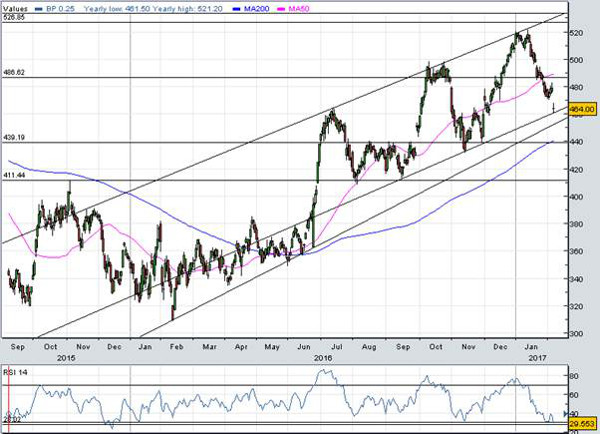BP yields 7% as shares hit two-month low
7th February 2017 15:17
by Lee Wild from interactive investor
Share on
It's been a great year for , certainly in terms of share price performance. The business is now worth two-thirds more than it was, and last month came within a whisker of the 2014 high. Tuesday's fourth-quarter results were mixed, true, and a dip in oil prices has taken the edge off things, but there's nothing to panic about here yet and that yield cannot be ignored.
A lot of the headlines focus on the $999 million (£808 million) loss in 2016 and tiny $72 million replacement cost (RC) profit for the fourth quarter. However, things aren't that bad, and those numbers include inventory holdings of a negative $1.1 billion and $425 million, respectively.
The fatal Deepwater Horizon oil spill in the Gulf of Mexico almost seven years ago has now cost BP $62.6 billion, and it continues to stain results.
However, strip out $180 million of so-called "non-operating items" and net unfavourable fair value accounting effects of $148 million, and BP made $400 million in the last three months of 2016, twice as much as the year before. Adjust for almost $3.6 billion of charges for the 12 months and BP made $2.6 billion in 2016.
Some will be disappointed with that three-month profit, given consensus estimates were for around $560 million. A one-third decline in profit at Rosneft, of which BP owns just under 20%, to $158 million was blamed on "increased government take", things like royalties, corporate taxes and profit sharing paid to Putin's Russia. Analysts had wanted bigger profits here.
And, following numerous acquisitions, including the ADCO onshore oil concession and Zohr gas field, BP now expects spending in 2017 to be $16-$17 billion. Adjusting minimum spend up from $15 billion means breakeven increases from $55 a barrel to $60.

Underlying operating profit - before finance costs and tax - of $856 million was 27% below consensus estimates, according to Jon Rigby, an analyst at UBS. Again, Rosneft was $120 million light at $135 million, and the downstream business - refining - missed by over $200 million at $877 million. A $400 million profit at the upstream division - exploration - was almost three times more than anticipated, but failed to make up the shortfall.
Elsewhere, there was little change in production, with quarterly output at 3.338 million barrels of oil equivalent per day (mboe/d), slightly better than expected. However, Rosneft chipped in more than anticipated, and BP’s quarterly output actually fell by 5.5% year-on-year to 2.19mboe/d.
Still, BP expects full-year 2017 underlying production to be higher than 2016, and UBS looks for total production of over 3.5mboe/d, helping triple profits in 2017.
And, for income seekers, the dividend of 10 cents per share is welcome, although, despite costing BP $4.6 billion last year, the company is committed to maintaining the payout. At current exchange rates, the yield is 7%.
And BP shares trade on a relatively modest 13 times forward earnings, dropping to about 10.5 based on UBS forecasts for 2018 earnings per share (EPS) of 43 cents, up from 14 cent. That's cheaper than on 16.4 and 13.8 times, respectively.
For the record, UBS thinks BP shares are a 'buy' and worth 550p.
This article is for information and discussion purposes only and does not form a recommendation to invest or otherwise. The value of an investment may fall. The investments referred to in this article may not be suitable for all investors, and if in doubt, an investor should seek advice from a qualified investment adviser.